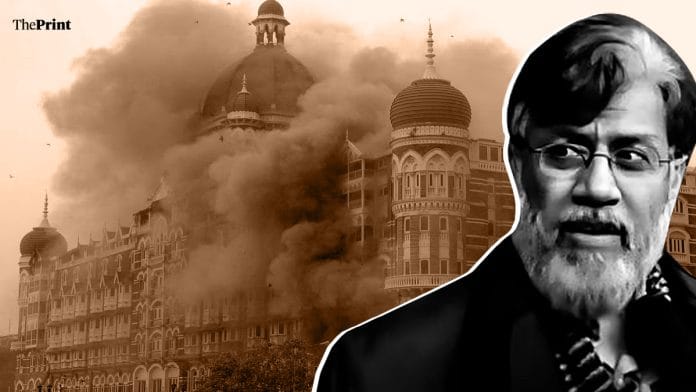New Delhi: The Pakistani government has distanced itself from Tahawwur Hussain Rana—a key accused in the 2008 Mumbai terror attack—confirming his Canadian citizenship.
The Pakistan foreign ministry’s spokesperson said in a press briefing Thursday that Rana—a former Pakistan army captain—has not renewed any of his Pakistani documents for over two decades. In response to questions raised by media persons, the Foreign Office emphasised that Rana’s Canadian nationality is indisputable.
The statement comes amid Pakistan media’s radio silence on Rana’s extradition.
Rana, 64, is one of the most significant figures connected to the 26/11 terror attack that left at least 166 people dead and over 300 injured. He is being flown into India after a prolonged legal battle in the United States over his extradition. Rana had been attempting to avoid facing charges in India for his alleged role in orchestrating the attacks.
In India, Rana faces charges of criminal conspiracy, terrorism and murder for his alleged involvement in the 26/11 attack. According to investigators, Rana played a crucial role in assisting fellow accused David Coleman Headley, a Pakistani-American who had conducted reconnaissance for the terror operation.
Rana’s arrival in Delhi will be heavily guarded, with Indian authorities making special arrangements for his transportation and likely detention at Tihar jail.
Also Read: Timeline of events leading up to 26/11 accused Tahawwur Rana’s extradition to India
The Pakistan connection
Rana was born in Chichawatni in Pakistan’s Punjab province. As a medical professional, he joined the Pakistan Army’s medical corps. However, in the late 1990s, he left the army and moved to Canada, where he obtained citizenship.
Rana was a childhood friend of Headley’s, who became involved with militant group Lashkar-e-Taiba (LeT), and played a pivotal role in the planning of the Mumbai attack. Rana allegedly assisted Headley in several ways, including providing logistical support and facilitating his travel, which enabled the latter to conduct surveillance on the targets in Mumbai.
In 2009, Rana was arrested in connection with his role in the terror attack. Despite being acquitted of direct participation in the attack, a US court convicted him for providing material support to terrorism, specifically aiding Headley in the planning of both the Mumbai and Copenhagen attacks. Rana was sentenced to 14 years in prison in 2013, but his legal battles continued as India pushed for his extradition.
Rana’s extradition process has been a drawn-out affair with several setbacks. Initially, he fought extradition to India, claiming his innocence and asserting that he had been framed by Headley. In 2011, a federal court in Chicago convicted him for his role in supporting Lashkar-e-Taiba and planning the attack on the Danish newspaper Jyllands-Posten. He continued to challenge his extradition to India, citing concerns over a fair trial.
However, in 2023, a Magistrate Court approved Rana’s extradition to India, marking a significant victory for Indian authorities. Rana went on to challenge the extradition with multiple pleas, but they were dismissed. In February 2025, US Secretary of State Marco Rubio signed Rana’s surrender to India.
In addition to his ties with Headley, Rana was linked to other militant groups, including Al-Qaeda. Investigations revealed that he communicated with Ilyas Kashmiri, a notorious Pakistani militant commander with ties to both Lashkar-e-Taiba and Al-Qaeda. These connections suggest that Rana may have been part of a broader network of extremists who collaborated across national borders.
Moreover, Rana’s involvement with former military personnel and their connections to terrorist organisations have raised significant questions about the extent to which Pakistan’s military establishment may have facilitated or tacitly supported terrorist activities, particularly those targeting India.
(Edited by Mannat Chugh)






